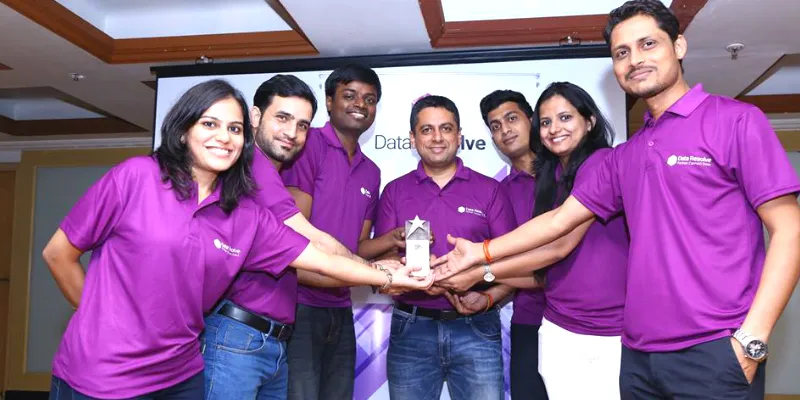Delhi-based startup is making businesses leak-proof with data security products
Data Resolve Technologies offers an integrated cyber security solution that uses behaviour analytics and employee monitoring software to null insider and cyber threats.
In 2016, India witnessed the biggest data security breach in the banking sector. Data of over 3.2 million debit cards were stolen, raising grave concerns over the vulnerability of data protection. Investigations showed that the incident had affected 19 banks; leading banks like SBI, HDFC, ICICI and Axis Bank were among the worst hit.
The large-scale data breach that happened due to systemic risk took the country by storm, raising grave concerns over vulnerability of data security and how businesses can gear up to prevent data breach.
Enter Data Resolve Technologies, a company that is empowering enterprises to be proactive about security, and helping them identify potential data exfiltration leaks in the system.
Dhruv Khanna, CEO, Data Resolve, says: “At a time when the world knew only about ethical hacking and everyone was just worried about external security threats to an organisation, the Data Resolve team envisioned that there could be persistent threats within the organisation as well.”
While the rapid boom in technology has simplified life, the ever-expanding space has also given birth to various challenges, including cyber security.

Data Resolve aims to tackle some of the key challenges with its core offering, inDefend, which helps in:
- Controlling different kinds of applications and devices that pose threat to a stable IT system
- Understanding different user behaviours based on their day to day activities
- Monitoring all types of emails and file uploads by different employees
- Monitoring roaming users who are not connected to an organisation’s gateway or network.
- Discovering unknown traces of sensitive data lying around the network
- Enforcing that data get copied to devices only in encrypted format, thereby minimising loss due to theft
How does inDefend work?
inDefend claims to be a complete insider threat management suite that provides real-time feed of data that’s been sent out on a daily basis. It creates a controlled environment for information outflow on various channels and portable devices. inDefend’s Cyber Intelligence reports bestow proactive warnings about probable data loss through notifications, alerts, SMS and emails to identify and block sensitive data from leakage.
Dhruv says: “inDefend was created to bridge the gap that the absence of employee vigilance and presence of even one single dangerous insider employee can bring down a business overnight.”
inDefend can be deployed as a cloud solution or as an in-house server based on an organisation’s policy.
The brand help organisations monitor applications with access to data, and orchestrate user specific access control policies so that users can only get hold of information required by them and allowed to be viewed by them. It can provide detailed logs and reports on data, monitor user activity for data exfiltration and provide early warning signs before a crime happens.
Also read: Protecting your enterprise from cyber attacks just got easier
The back story
Launched in 2008, Data Resolve Technologies is an IIT Kharagpur incubated cyber security startup. The company was initially headquartered in Kolkata. It later shifted base to Delhi, sensing industry demand and need.
“The entire idea kick-started from a small but powerful thought that anybody can take away sensitive files on a USB drive without anybody in the organisation knowing. This led to the creation of inDefend,” Dhruv says.
Data Resolve is spearheaded by a number of innovative minds. However, Dhruv, 40, is at the helm of the startup’s leadership team. Dhruv has been into the Information Security business for more than 17 years. Before this, he served as country leader for Information Security Services in IBM and had senior roles with other infosec firms.
Devesh Kumar Mittal (ex-British Telecom), Nagarjun Kota (ex-JP Morgan) and Dipanjan Biswas manage the product and engineering divisions of the company.
Mapping future plans
Being a B2B SaaS service, the brand generates revenues through a monthly subscription-based model.
To simplify the revenue model, Dhruv says clients pay based on the number of endpoints being monitored/protected on inDefend and what modules are they using.
Data Resolve claims to have witnessed a 300 percent growth year-on-year, highlighting that it is likely to touch the $1 million mark this year.
Backed by a team of 60-70 employees, Data Resolve has cracked a couple of funding rounds. So far, the brand has raised angel investments from German and Indian investors and got an investment of $1 million from IDFC Parampara Capital earlier this year. The startup is now gearing up to raise its Series A funding.
Also read: Indian techies driving next-gen cyber security architecture: McAfee CEO
In the near future, Data Resolve aims to become a proactive security response system by tracking data at rest and all available data in motion channels. It also plans to expand its capability portfolio to complex security threats like ransomware and zero-day threats like malware. The startup is eyeing expansion of its operations to other countries in the Middle East along with Canada and the US to tap the wider enterprise market.
“We aim to revolutionise the User Behaviour Security Analytics market by merging the study of human psychology with digital activity analysis with the help of AI and Machine Learning. This will ensure we are able to predict future probable security incidents and take proactive measures,” Dhruv ends.







